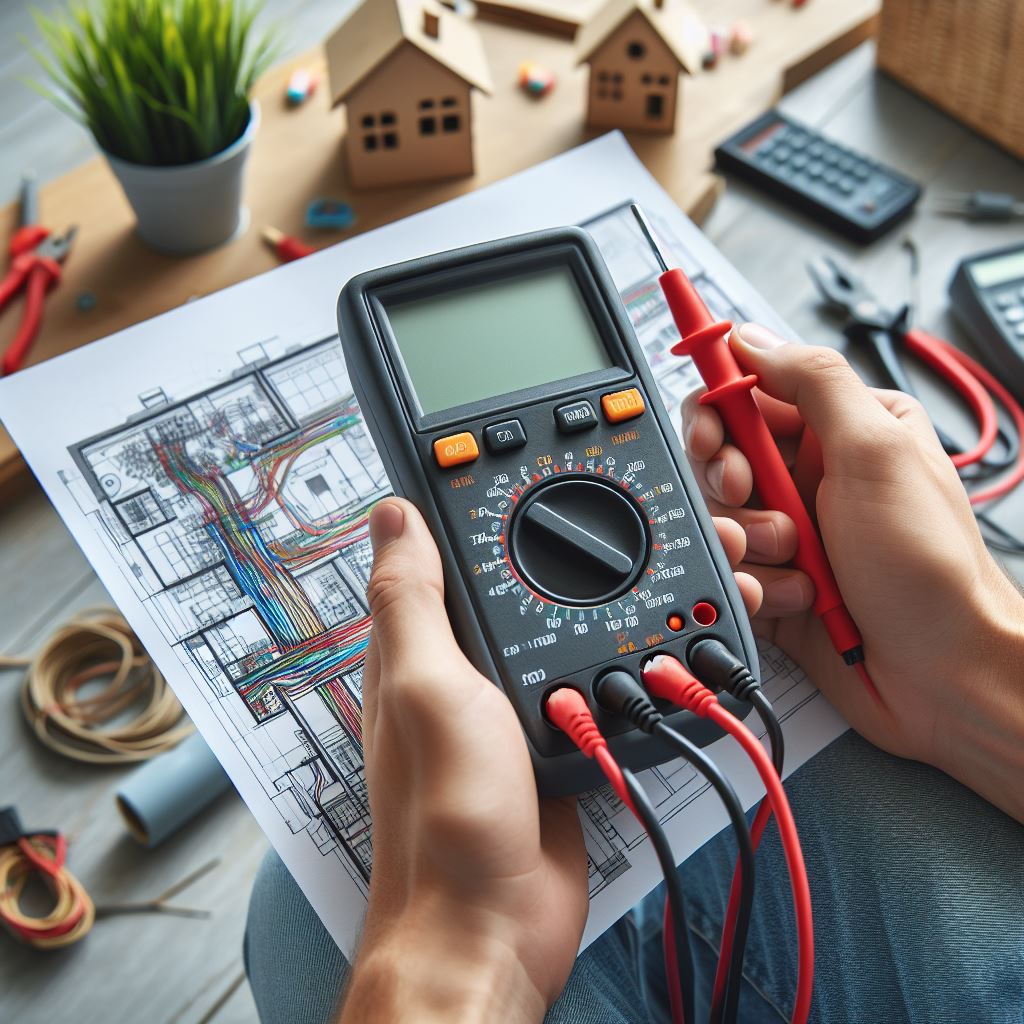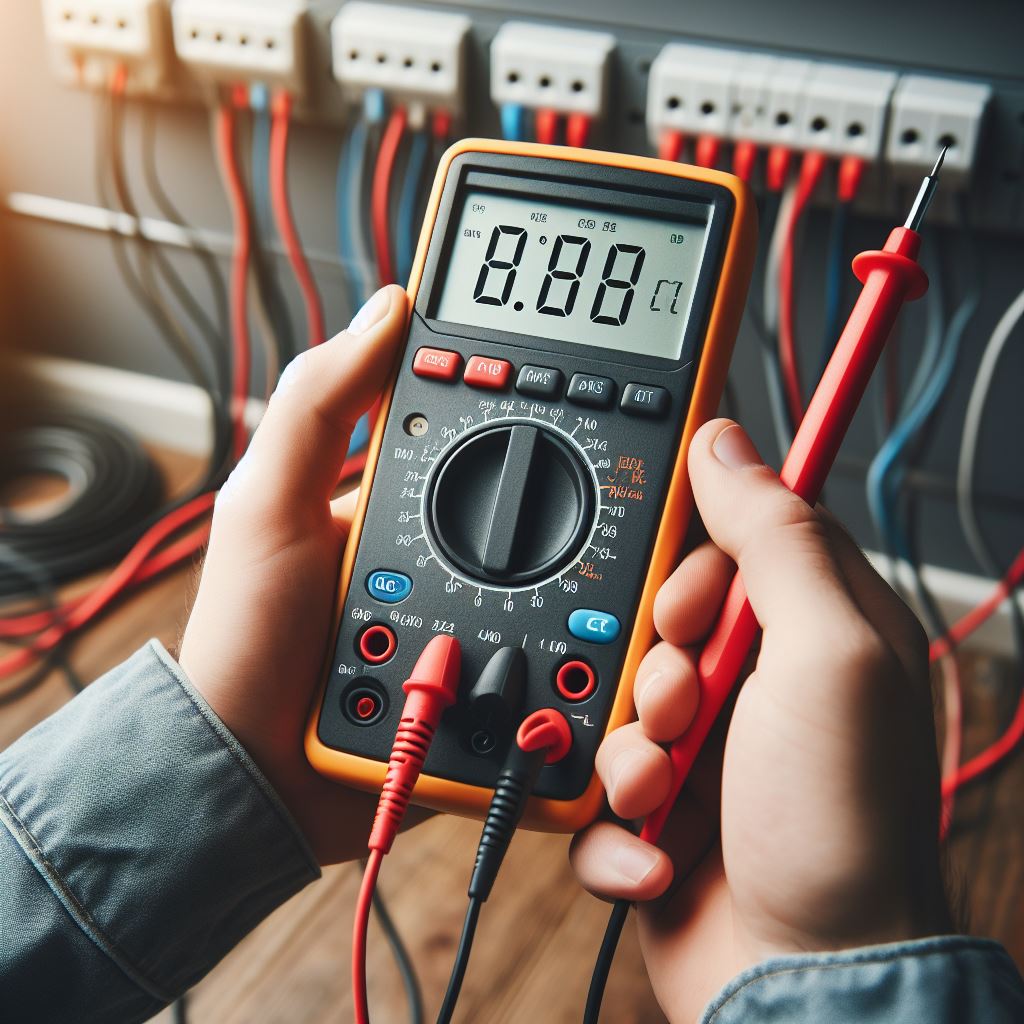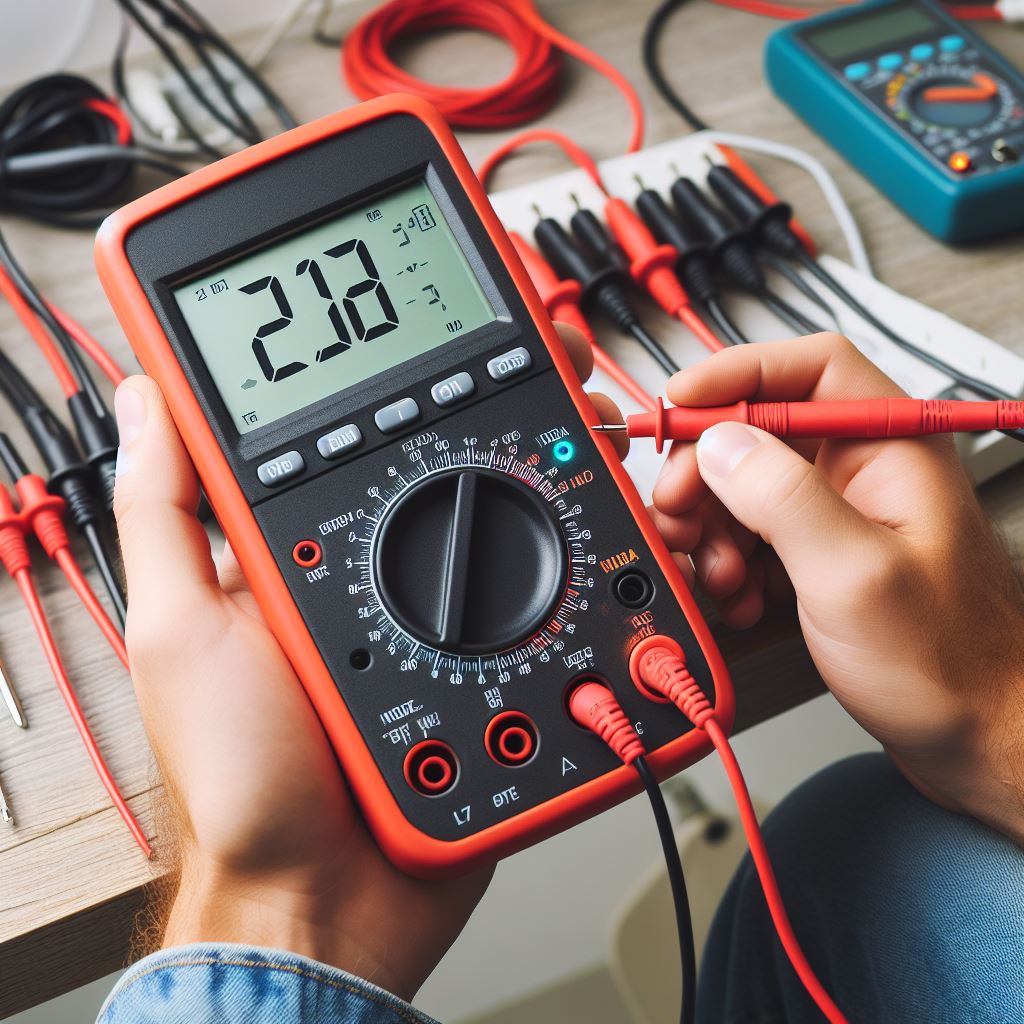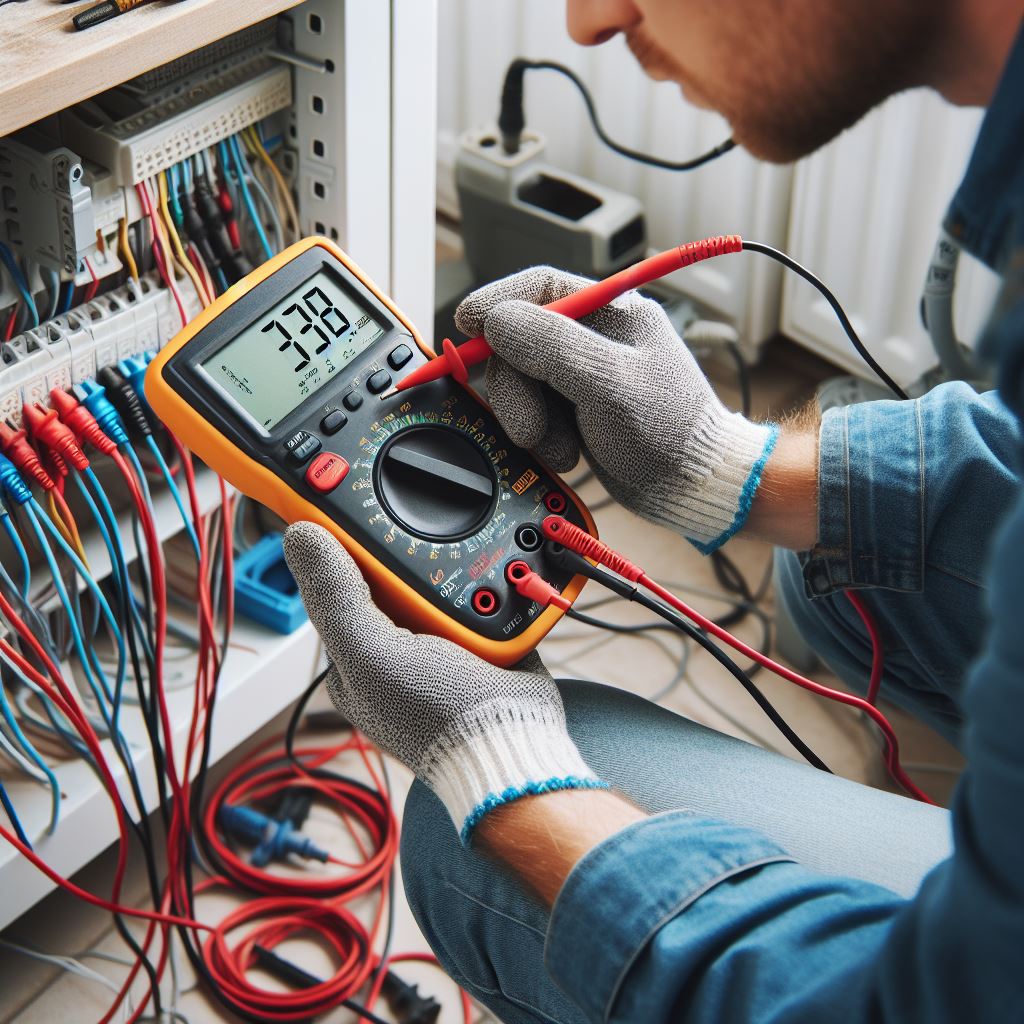Benefits of Using a Digital Multimeter for Accurate Electrical Measurements in Home Inspections
Home inspections are an essential part of the home buying process. They provide potential buyers with a comprehensive assessment of the property’s condition, including its electrical system. Accurate electrical measurements are crucial in determining the safety and functionality of a home’s electrical system. One tool that is indispensable for conducting accurate electrical measurements during home inspections is a digital multimeter.

A digital multimeter is a versatile device that combines several measurement functions into one compact unit. It is capable of measuring voltage, current, and resistance, making it an invaluable tool for electricians, engineers, and home inspectors. Unlike analog multimeters, which use a needle to indicate measurements, digital multimeters provide precise numerical readings on a digital display. This feature allows for more accurate and reliable measurements, especially when dealing with low voltage or small current values.
One of the primary benefits of using a digital multimeter in home inspections is its ability to measure voltage. Voltage is a critical parameter in assessing the electrical system’s condition, as it indicates the potential difference between two points in a circuit. By measuring voltage, home inspectors can identify potential issues such as overloaded circuits, faulty wiring, or inadequate grounding. These issues can pose serious safety hazards and may require immediate attention.
Another advantage of using a digital multimeter is its capability to measure current. Current is the flow of electric charge in a circuit and is measured in amperes. By measuring current, home inspectors can determine if the electrical system is properly sized to handle the load it is subjected to. Overloaded circuits can lead to overheating, which can cause electrical fires. By accurately measuring current, home inspectors can identify potential overloads and recommend necessary upgrades or repairs.
Resistance is another parameter that can be measured using a digital multimeter. Resistance is the opposition to the flow of electric current and is measured in ohms. By measuring resistance, home inspectors can identify faulty components, such as damaged wires or loose connections. These issues can cause voltage drops, which can affect the performance of electrical devices and appliances. By accurately measuring resistance, home inspectors can pinpoint the source of the problem and recommend appropriate repairs.
In addition to these primary measurements, digital multimeters often offer additional features that can enhance the accuracy and efficiency of home inspections. Some models include a continuity test function, which allows home inspectors to quickly check if a circuit is complete or if there is a break in the wiring. This feature is particularly useful in identifying open circuits or faulty switches.
Furthermore, many digital multimeters have a diode test function, which can be used to check the functionality of diodes in electrical components. Diodes are electronic devices that allow current to flow in one direction only. By testing diodes, home inspectors can ensure that electrical components, such as rectifiers or light-emitting diodes (LEDs), are functioning correctly.
In conclusion, the use of a digital multimeter is of utmost importance in home inspections, particularly when it comes to accurate electrical measurements. By measuring voltage, current, and resistance, home inspectors can identify potential safety hazards and assess the overall condition of the electrical system. The additional features offered by digital multimeters, such as continuity and diode tests, further enhance their usefulness in home inspections. Therefore, investing in a high-quality digital multimeter is essential for any professional involved in home inspections.
How a Digital Multimeter Enhances Safety and Efficiency in Home Inspections
Home inspections are a crucial part of the home buying process, as they provide potential buyers with a comprehensive assessment of the property’s condition. These inspections help identify any existing or potential issues that may affect the safety, functionality, and value of the home. To conduct a thorough inspection, home inspectors rely on a variety of tools and equipment, one of which is the digital multimeter.
A digital multimeter is a versatile device that measures electrical voltage, current, and resistance. It is an essential tool for home inspectors as it allows them to assess the electrical systems in a home accurately. By using a digital multimeter, inspectors can identify faulty wiring, overloaded circuits, and other electrical issues that may pose safety hazards.

One of the primary benefits of using a digital multimeter in home inspections is the enhanced safety it provides. Electrical systems can be complex and potentially dangerous, especially if they are not properly maintained or if there are hidden issues. By using a digital multimeter, home inspectors can detect electrical problems before they become major safety concerns.
For example, a digital multimeter can help identify faulty wiring that may be a fire hazard. By measuring the voltage and resistance in the electrical system, inspectors can determine if there are any abnormal readings that indicate a potential problem. This allows them to recommend necessary repairs or replacements to ensure the safety of the home’s occupants.
In addition to safety, using a digital multimeter also enhances the efficiency of home inspections. Traditional methods of inspecting electrical systems often involve visual inspections and manual testing, which can be time-consuming and less accurate. A digital multimeter, on the other hand, provides precise measurements and readings, allowing inspectors to quickly identify any issues.
Furthermore, a digital multimeter can help inspectors diagnose electrical problems more effectively. For instance, if a circuit is not functioning correctly, a digital multimeter can be used to measure the voltage at different points along the circuit. This helps pinpoint the exact location of the problem, saving time and effort in troubleshooting.
Moreover, digital multimeters often come with additional features that further enhance their usefulness in home inspections. Some models have built-in temperature sensors, which can be used to detect overheating in electrical components. This is particularly important in older homes where outdated wiring or electrical systems may be more prone to overheating.
Additionally, digital multimeters can also measure continuity, which is the ability of an electrical circuit to conduct electricity. This feature allows inspectors to check if there are any breaks or interruptions in the circuit, which may indicate faulty connections or damaged wiring.
In conclusion, the use of a digital multimeter in home inspections is of utmost importance. It not only enhances the safety of the inspection process by identifying potential electrical hazards but also improves efficiency by providing accurate measurements and diagnoses. With its additional features, a digital multimeter is a valuable tool that helps home inspectors ensure the safety and functionality of a home’s electrical systems.
The Role of Digital Multimeters in Identifying and Troubleshooting Electrical Issues during Home Inspections
Home inspections are an essential part of the home buying process. They provide potential buyers with a comprehensive assessment of the property’s condition, including its electrical system. One of the most valuable tools used by home inspectors is the digital multimeter. This device plays a crucial role in identifying and troubleshooting electrical issues, ensuring the safety and functionality of a home’s electrical system.
A digital multimeter is a versatile instrument that combines several measurement functions into one device. It can measure voltage, current, and resistance, making it an indispensable tool for electrical inspections. By using a digital multimeter, home inspectors can accurately assess the condition of electrical components and identify potential problems.

One of the primary uses of a digital multimeter during a home inspection is to measure voltage. Voltage is the force that drives electrical current through a circuit. By measuring voltage, home inspectors can determine if the electrical system is functioning properly. They can identify any voltage drops or fluctuations that may indicate faulty wiring or overloaded circuits. This information is crucial for ensuring the safety of the home’s occupants and preventing electrical fires.
In addition to measuring voltage, a digital multimeter can also measure current. Current is the flow of electrical charge through a circuit. By measuring current, home inspectors can determine if the electrical system is properly balanced. They can identify any excessive current that may indicate a short circuit or an overloaded circuit. This information is vital for preventing electrical hazards and ensuring the longevity of electrical components.
Resistance is another important parameter that can be measured using a digital multimeter. Resistance is the opposition to the flow of electrical current. By measuring resistance, home inspectors can identify any faulty electrical components or connections. They can detect loose wires, corroded terminals, or damaged insulation. This information is crucial for preventing electrical malfunctions and ensuring the efficiency of the electrical system.
Digital multimeters also play a significant role in troubleshooting electrical issues during home inspections. When a problem is identified, home inspectors can use the digital multimeter to pinpoint the source of the issue. By measuring voltage, current, and resistance at different points in the electrical system, they can narrow down the problem to a specific component or connection. This information is invaluable for making informed decisions about repairs or replacements.
Furthermore, digital multimeters provide accurate and reliable measurements, ensuring the effectiveness of home inspections. Unlike analog multimeters, which can be affected by external factors such as temperature or humidity, digital multimeters provide precise readings. This accuracy is essential for identifying subtle electrical issues that may go unnoticed with less precise instruments.
In conclusion, the use of a digital multimeter is of utmost importance in home inspections. These versatile devices allow home inspectors to accurately measure voltage, current, and resistance, providing valuable information about the condition of the electrical system. They play a crucial role in identifying and troubleshooting electrical issues, ensuring the safety and functionality of a home’s electrical system. With their accuracy and reliability, digital multimeters are indispensable tools for any home inspector.
